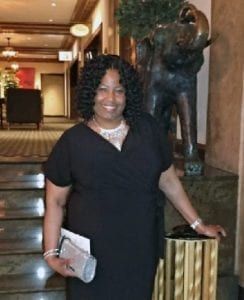by Aisling Mäki, Special to The New Tri-State Defender

Angela Gordon had no known health issues when she ended up in the emergency room with an unbearable headache. It was there that she discovered she had hereditary hypertension. And although she was just 19 years old, her blood pressure had reached stroke level. What shocked her most was learning that her kidneys had already developed scars and she would eventually need a kidney transplant.
In 2006, she underwent a procedure at the Methodist Transplant Institute to receive the kidney of a donor who had died in a car wreck. Gordon’s body later rejected the organ and, three years ago this month, she underwent a second kidney transplant. Thanks to medical advancements in recent years, she is doing well. She is alive today because two people made the decision to donate their organs.
Gordon has since become an ambassador for the Mid-South Transplant Foundation (MSTF), educating the public about her experience as a two-time organ recipient.
“MSTF is wonderful because they showed me I wasn’t the only one dealing with the emotions I had around the fact that someone had to lose their life in order to save mine,” she said. “They let me know that was the wish of the donor, to help somebody, and that there’s no need to feel guilty. It meant a lot just to have a group there who understood and to know there are a lot of other people like me.”
According to the United Network for Organ Sharing, there are 113,697 on the national waiting list, and 94,913 are waiting for a kidney. More than 4,000 Mid-Southerners are awaiting organ and tissue donation, and 2,000 of them are African Americans waiting for kidneys. This is due in part to the significant prevalence of high blood pressure and diabetes in the Mid-South community.
However, despite the need, many people are still not registering to become organ and tissue donors.
“Even though so many of us have people in our family who have high blood pressure and diabetes and may need transplants, still, not enough of us choose to donate our organs to save lives,” Gordon said. “One person can save up to 50 lives with their tissue and organs, and many more lives because you touch the families of people’s loved ones who are waiting. We can do something about it.”
According to MSTP, it’s often a lack of knowledge, lack of trust of the medical profession, and a number of common myths that prevent people from registering as organ and tissue donors.
For example, some believe there are costs associated with donation, which is false. The donor’s family pays nothing for the cost of donation. All costs related to the donation of organs and tissues are paid by the recipient, usually through insurance, Medicare or Medicaid.
Some people believe their religion doesn’t support donation, when, in fact, all major religions support organ and tissue donation and see it as a final act of love and generosity toward others by giving the ultimate gift of life.
Another persistent myth people believe is that no one will want their organs and tissues because of their age or medical history. However, age and most medical conditions do not exclude you from being a suitable organ and tissue donor. There are very few rule-outs, and due to medical advancements, those few may even change over time.
Many people believe that emergency room doctors will not work as hard to save the life of an organ and tissue donor, which is also untrue. Doctors who work to save lives are not the same doctors involved with organ donation, and organ donation will be considered only after every attempt has been made to save your life.
MSTF ambassadors like Gordon are working hard to educate the community about the facts of donation and transplantation by visiting churches, colleges, high schools, civic groups, health awareness events and workplace partner events. And that education seems to be having an impact; In 2018, the number of transplants was on the rise.
“I feel it’s due to increased education,” said Randa Lipman, MSTF Community Outreach Manager. “However, the needs are still so great in our community. Every 10 minutes, another person is added to the waiting list, and 22 people die each day because the organs they need are not donated in time.”
Registering is easy. Simply check “yes” to be an organ and tissue donor every time you renew your driver’s license or state I.D, or register online; the MSTF website has a link to state registries where you can update your wishes at any time.
Friday, April 12 is Blue and Green Day 901. The Big River Crossing and Hernando de Soto Bridge will be lit blue and green for organ and tissue donor awareness. Shelby County School employees and students will wear blue and green, city and county governments will decorate their offices and wear blue and green, and an exciting surprise will be in store for the public at Overton Square at 6 p.m. Learn more about Blue and Green Day 901 at www.midsouthtransplant.org.





